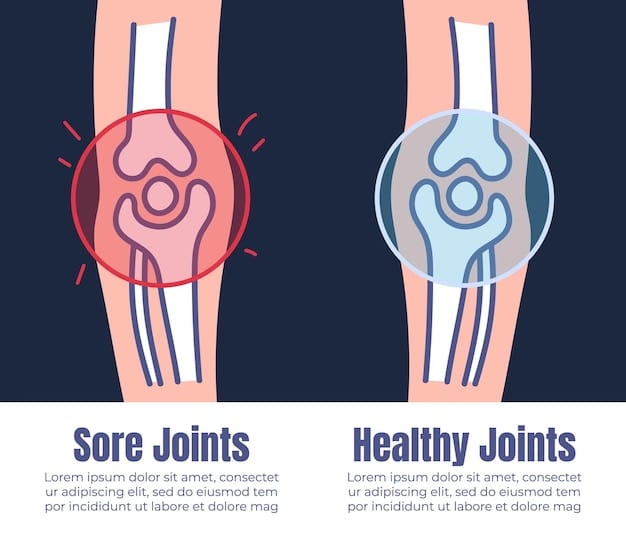Top 5 Anti-Aging Supplements for Joint Health in 2025

Discover the top 5 anti-aging supplements poised to revolutionize joint health in 2025, offering innovative solutions for mobility and overall well-being.
As we approach 2025, maintaining healthy joints remains a top priority for many. With advancements in nutritional science, several anti-aging supplements are emerging as promising solutions. This article explores **the top 5 anti-aging supplements for joint health in 2025**, providing insights into their benefits and how they can support a more active and comfortable lifestyle.
Understanding Joint Health and Aging
Joint health is crucial for mobility, flexibility, and overall quality of life. As we age, the natural wear and tear on our joints can lead to discomfort, stiffness, and reduced range of motion. Understanding the aging process in joints is the first step in proactively addressing these issues.
The Natural Aging Process of Joints
The aging process affects joints in several ways. Cartilage, the protective tissue that cushions the ends of bones within a joint, can break down over time. This breakdown leads to less cushioning and more friction.
Factors Contributing to Joint Problems
Several factors can accelerate joint problems, including genetics, lifestyle, and diet. Genetic predispositions can make some individuals more susceptible to joint issues. Lifestyle factors such as physical activity or sedentary behaviors also play a role.
- Genetics: A family history of arthritis or other joint conditions increases your risk.
- Weight: Extra weight puts additional stress on weight-bearing joints like knees and hips.
- Physical Activity: Both overuse and underuse can contribute to joint problems.
- Diet: A diet lacking essential nutrients can impact joint health.

Addressing these factors through lifestyle changes and supplementation can significantly impact joint health and slow down the aging process in the joints. Understanding the risks allows for a proactive approach to wellness.
Collagen Supplements for Joint Support
Collagen is a protein that provides structure to various tissues in the body, including cartilage. As we age, the body’s natural collagen production decreases, leading to joint degradation. Collagen supplements can help replenish these lost proteins.
Types of Collagen for Joint Health
Different types of collagen supplements exist, each offering unique benefits. Type II collagen is specifically found in cartilage, making it a popular choice for joint health. Other types, such as Type I and Type III, support overall connective tissue health.
Benefits of Collagen Supplementation
Collagen supplementation can provide several benefits for joint health. Studies have shown that it can reduce joint pain, improve mobility, and even stimulate cartilage regeneration.
- Reduces Joint Pain: Collagen peptides can reduce pain associated with osteoarthritis.
- Improves Mobility: Regular intake enhances joint flexibility and range of motion.
- Stimulates Cartilage Regeneration: Some studies suggest collagen may aid in repairing damaged cartilage.
Collagen supplementation is a valuable strategy for maintaining joint health. Choosing the right type and incorporating it into a daily routine can lead to significant improvements in joint function and comfort.
Glucosamine and Chondroitin: A Classic Combination
Glucosamine and chondroitin are two well-known supplements often used together to support joint health. They are natural compounds found in cartilage and play a vital role in maintaining its structure and function.
How Glucosamine and Chondroitin Work
Glucosamine and chondroitin work synergistically to protect and rebuild cartilage. Glucosamine helps form and repair cartilage, while chondroitin helps retain water within the cartilage, keeping it healthy and hydrated.
Research on Glucosamine and Chondroitin
Numerous studies have investigated the benefits of glucosamine and chondroitin for joint health. While some studies show positive results, others are less conclusive, but the overall consensus suggests that they can be effective for some individuals.
- Pain Relief: Many users report reduced joint pain with regular use.
- Cartilage Protection: They may help slow the breakdown of cartilage.
- Improved Joint Function: Enhanced mobility and reduced stiffness are often reported.

Consider glucosamine and chondroitin as part of your joint health regimen. They remain a cornerstone for many seeking to maintain healthy and flexible joints as they age.
Turmeric and Curcumin for Inflammation
Turmeric is a spice widely used in traditional medicine known for its potent anti-inflammatory properties. Curcumin, the active compound in turmeric, is responsible for most of its health benefits, making it an excellent supplement for joint health.
The Anti-Inflammatory Power of Curcumin
Curcumin works by inhibiting inflammatory pathways in the body. Chronic inflammation is a major contributor to joint pain and stiffness, so reducing inflammation can significantly improve joint comfort.
Benefits of Turmeric for Joint Health
Turmeric and curcumin have been shown to reduce joint pain, improve mobility, and protect against cartilage damage. Its natural anti-inflammatory effects make it a popular choice for those seeking natural joint support.
Taking turmeric or curcumin supplements can be a natural and effective way to manage joint pain and inflammation. Its long history of use and growing scientific support make it a valuable addition to any joint health plan.
Omega-3 Fatty Acids for Joint Lubrication
Omega-3 fatty acids are essential fats known for their numerous health benefits, including supporting joint health. These fats, found in fish oil and flaxseed oil, can help reduce inflammation and lubricate joints.
Sources of Omega-3 Fatty Acids
The best sources of omega-3 fatty acids are fatty fish like salmon, mackerel, and sardines. Plant-based sources include flaxseeds, chia seeds, and walnuts. Supplements such as fish oil and algal oil provide concentrated doses of omega-3s.
How Omega-3s Support Joint Health
Omega-3 fatty acids reduce inflammation by producing anti-inflammatory compounds. They also help lubricate joints, promoting smoother movement and reducing friction.
- Reduces Inflammation: EPA and DHA, types of omega-3s, have potent anti-inflammatory effects.
- Lubricates Joints: Improved joint lubrication reduces friction and discomfort.
- Supports Cartilage Health: Omega-3s may help protect cartilage from degradation.
Omega-3 fatty acids offer a holistic approach to joint health. Incorporating them into your diet or supplementing with them can lead to significant improvements in joint function and comfort.
Hyaluronic Acid: Hydration for Joint Comfort
Hyaluronic acid (HA) is a naturally occurring substance in the body, particularly concentrated in the joints and skin. It acts as a lubricant and shock absorber in the joints, keeping them flexible and well-hydrated.
The Role of Hyaluronic Acid in Joint Health
Hyaluronic acid helps maintain the viscosity of synovial fluid, the fluid that surrounds and cushions the joints. This lubrication is crucial for reducing friction and supporting smooth joint movement.
Benefits of Hyaluronic Acid Supplements
HA supplements can improve joint hydration, reduce pain, and enhance mobility. It’s often used to alleviate symptoms of osteoarthritis and other joint conditions.
- Enhances Joint Hydration: HA attracts and retains water, keeping joints lubricated.
- Reduces Pain: By improving lubrication, HA can reduce pain associated with joint friction.
- Improves Mobility: Increased hydration supports smoother joint movement and flexibility.
Consider hyaluronic acid if you’re looking to enhance the hydration and lubrication of your joints. Its unique properties make it a valuable asset for maintaining joint comfort and function.
| Key Supplement | Brief Description |
|---|---|
| 💪 Collagen | Supports cartilage structure and reduces joint pain. |
| 💊 Glucosamine & Chondroitin | Protects cartilage and improves joint function. |
| 🌿 Turmeric/Curcumin | Reduces inflammation and joint pain naturally. |
| 💧 Hyaluronic Acid | Enhances joint hydration and reduces friction. |
Frequently Asked Questions
▼
Anti-aging supplements for joint health are designed to reduce inflammation, support cartilage health, and improve joint lubrication. They often contain ingredients like collagen, glucosamine, chondroitin, and omega-3 fatty acids.
▼
Collagen supplements provide the building blocks needed to repair and rebuild cartilage. By replenishing collagen levels, they can reduce joint pain and improve mobility in people with osteoarthritis.
▼
Glucosamine and chondroitin are generally considered safe, but some people may experience mild side effects such as nausea, heartburn, or diarrhea. Consult with a healthcare provider before starting supplementation.
▼
Turmeric contains curcumin, a powerful anti-inflammatory compound. Curcumin inhibits inflammatory pathways in the body, reducing joint pain and stiffness associated with conditions like arthritis.
▼
Yes, omega-3 fatty acids can improve joint lubrication by reducing inflammation and supporting the production of synovial fluid. This helps to reduce friction between joints, making movement smoother and more comfortable.
Conclusion
Maintaining joint health is essential for an active and fulfilling life, especially as we age. Incorporating these top 5 anti-aging supplements—collagen, glucosamine and chondroitin, turmeric, omega-3 fatty acids, and hyaluronic acid—into your daily routine can provide comprehensive support for your joints, ensuring mobility and comfort for years to come.





